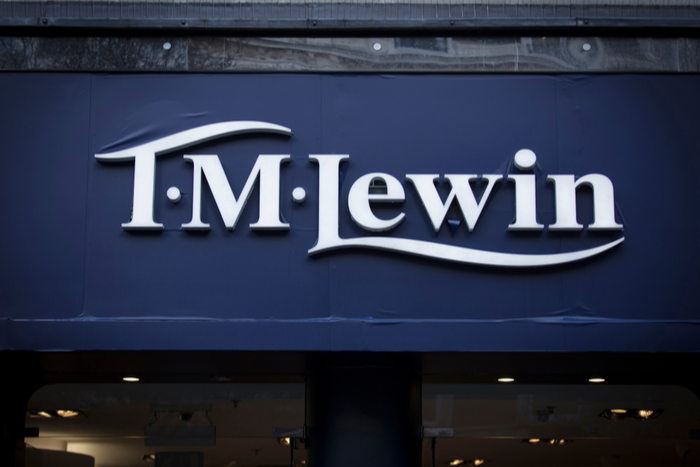A BRIEF TIMELINE
1898: Thomas Mayes Lewin, in partnership with Geoffrey James Lewin, opens his first shop on London’s Panton Street. TM Lewin started out making shirts but later started to sell suits, outerwear, knitwear, jackets, chinos, ties and accessories for men.
1903: The menswear retailer relocated to Jermyn Street in London. TM Lewin’s “coat shirt” was described as a “novel idea” in British magazine London Opinion and Today. TM Lewin developed a reputation for design and quality among London’s gentlemen.
1914: During World War I, TM Lewin supplied the RAF and British Army with uniform.
1938: Following Thomas Mayes Lewin’s retirement, the partnership with Geoffrey James Lewin was dissolved. The business continued operating as TM Lewin and Sons Ltd.
1978: The McKenna family acquires TM Lewin.
1980: Geoff Quinn joins TM Lewin as chief executive.
1982: Quinn grows TM Lewin so that it had its first £1 million that year.
1993: The retailer starts an early mail order facility and begins moving production from its factory in Southend-on-Sea overseas into Europe.
2000: TM Lewin opens fifth store at Ludgate Circus in London and starts testing promotional offers.

2005: TM Lewin branches out from shirts and starts making suits. It also supplies the ties for the London 2012 Olympic Bid and introduced the four-for-£100 deal.
2006: Caird Capital acquires a 20 per cent stake in TM Lewin, when it backed a management buyout led by Quinn.
2011: TM Lewin had 100 UK stores and outlets. In trading results published in November, TM Lewin saw its annual revenues surpass £100 million for the first time ever. For the year to February 26, 2011, sales rose 20 per cent year-on-year to £100.3 million and EBITDA grew five per cent to £14.7 million. TM Lewin‘s growth continued into the financial year, with sales up to £50.4 million in the 26 weeks to August 27, 2011 – a nine per cent rise compared to the same period in 2010.
2012: TM launches first overseas store in Sydney, Australia. TM Lewin also branches out to casualwear. The offering included knitwear, casual shirts and chinos, alongside a range of seasonal jackets and blazers.
In August, TM Lewin management, backed by Bain Capital affiliate Sankaty Advisors, bought out Caird Capital’s 20 per cent stake. TM Lewin’s management already owned 80 per cent of the business, which was made up of Quinn’s 30 per cent, and the rest of the management’s 50 per cent. The deal was thought to have valued TM Lewin at £100 million.
2017: Gary Lineker becomes the face of TM Lewin. In August, the former chief operating officer of Thai restaurant chain Busaba Eathai joined TM Lewin as chief financial officer. In September, John Scott joined as international director.

2018: In March, the international managing director of New Look, Sven Gaede, took over as chief executive – replacing Geoff Quinn, who held the top role since 1993. Quinn became chairman and continued to be an active board member. For the year to February 24, 2018, the brand reported an operating profit of £73,000, with a turnover of £120 million – compared to £109 million the year before.
That same year, TM Lewin opened its first store in India. Internationally, the brand has franchise partnerships in 16 countries, including the Czech Republic, Singapore, Malaysia, South Africa and Ghana.
2019: TM Lewin opens a new 3000sq ft store on London’s Oxford Street. In August, TM Lewin appointed the former chief executive of N Brown, Angela Luger, to the position of chair.
2020: In mid-April, Bain Capital kickstarted a sales process of TM Lewin and enlisted corporate finance firm Alantra to run the auction. TM Lewin also furloughed approximately 650 of its 700-strong staff under the UK government’s Coronavirus Job Retention Scheme, as the stores remained closed during lockdown.
May 2: TM Lewin’s rival and multichannel menswear retailer Charles Tyrwhitt said it was mulling a takeover of the retailer.
May 13: TM Lewin was bought by London-based private equity firm SCP from Bain Capital, via its subsidiary acquisition vehicle Torque Brands for an undisclosed sum. The vehicle was set up by SCP to “acquire a portfolio of complementary British brands into one centralised shared services platform”.

June 15: SCP warns landlords that most of TM Lewin stores would shut down if rent cuts are not granted. SCP hired commercial property consultants from Cedar Dean to handle negotiations. The advisors reportedly told landlords that TM Lewin would be put into pre-pack administration unless they agree on significant rent cuts. SCP said it planned to hold on to a handful of TM Lewin shops but will decide locations depending on how negotiations with landlords pan out.
June 18: Gaede steps down from his role, along with Lombardo.
June 28: SCP drafts in restructuring experts ReSolve, which put the majority of TM Lewin’s 66 stores at risk of permanent closure. ReSolve was called in for the menswear retailer to make it a principally online brand with very few stores. A pre-pack administration deal was also on the cards, which placed hundreds of jobs at risk.
June 30: TM Lewin says it will permanently shut its entire store estate as it struggles to pay rent and other costs for its stores, which remained closed since lockdown was implemented in March. The retailer will continue to trade online.
TM Lewin’s assets were bought back by its owner Torque Brands through a pre-pack administration deal – but not its 66 shops. The deal resulted in 600 job losses.
THE REASONS
When TM Lewin fell into pre-pack administration last week, it became the latest retail victim of the coronavirus crisis after proving unable to hold its place on the high street.
The national lockdown on non-essential retailer piled pressure on the menswear retailer, which was already feeling the stress of a struggling retail sector.
Its current owner, Torque Brands, only acquired TM Lewin in May this year with plans to restructure it. Within two months, it placed the chain in administration and immediately bought back TM Lewin’s online business via a pre-pack deal. It resulted in the permanent closure of TM Lewin’s 66 shops, thus providing little comfort for its 600 employees.
A major challenge for retailers, whether or not they were struggling before the Covid-19 pandemic, is not knowing how their business models need to adapt for an unknown trading environment. Like TM Lewin, several were pushed into administration and subsequently restructured into online-only businesses as a “safe harbour” and in the expectation that online-only is a safe bet.
John Bell, founder and senior partner at insolvency practitioner Clarke Bell, said: “Covid-19 has undoubtedly wreaked havoc on the retail sector and high rents, which by not being paid, is having a knock-on effect on landlords who are being faced with empty shops and plunging rental income.”
“Consumers switched to online retail at a staggering rate during lockdown, and with many consumers now facing uncertain futures once their furlough scheme ends, people are simply cutting down on their expenditure in anticipation of possibly losing their jobs,” he said.
“TM Lewin focuses on selling formal menswear & this area has been under pressure for a long time”
Now that TM Lewin has shifted to online, with the online space in this sector already being crowded with established ecommerce stores from the likes of Charles Tyrwhitt, Hawes and Curtis, and LVMH-owned Pink, rivals will look to respond aggressively.
Meanwhile, fast-growing brands such as the US-based retailer Untuckit, which launched in the UK last year and now has two stores in London, may be better positioned with its product proposition to take full advantage of the recent and less formal menswear trends.
The men’s shirt and suit industry for a long time has been under extreme price pressure,” Future Retail Consulting founder Catherine Erdly told Retail Gazette.
“All the main players in this area, for example, TM Lewin and Charles Tyrwhitt to name just two have been focused for a long time on endless offers to drive sales,” she said.
“It’s very rare to see a strong full price offer from TM Lewin who have run endless multi-buy offers on their core product categories.
“Just like all other retailers, it’s been facing rising costs, whether that’s the increase of living wage or the increased costs of doing business with the UK exchange rate dropping down.
“With such a heavily discounted product area, it’s hard to see how it could possibly have been making much profit at all.
“On top of that TM Lewin focuses on selling formal men and womenswear and this area has been under pressure for a long period of time.
“TM Lewin has built its business on selling attire for offices that still require a formal suit and tie however the number of these offices has been dwindling considerably over the last few years as people adopt a more casual approach to work.
“Coronavirus is not ultimately to blame but it sped up what was inevitable”
“With lockdown coming and the growth from working at home, it is easy to see how the demand for TM Lewin’s products would have completely dropped off. It’s hard to see who would be looking to buy suits, ties or shirts during the pandemic.
“While Covid-19 has hit them hard, they were no doubt struggling beforehand. It’s very hard to see how this business model will recover unless they are to differentiate themselves and become a leading authority of casual office wear.”
Nottingham Business School retail research associate Nelson Blackley agreed. He said the biggest challenge for TM Lewin pre-pandemic was that over the last few years, there has been a decreasing need and expectation for office-based employees to dress in a conventional “business wear” uniform of suits, shirts and ties in the office every day.
“It started with the advent of ‘dress down Fridays’ over a decade ago but now has extended for many to the entire working week,” he said, highlighting how the lockdown has scrapped any need for business suits as people worked from home.
Moreover, Blackley highlighted TM Lewin’s website says their suits “are all beautifully tailored and cut with exquisite details” but at prices between £200 to £500, “it will be interesting to observe just how successful they are selling online only”.
Arguably, those looking to buy business and other formalwear, and spending hundred of pounds to do so, may prefer an appointment for advice and to be fitted for items.
When lockdown for non-essential retailers was lifted last month, TM Lewin chose not to reopen its stores because it relied on services such as measuring, which were not possible to deliver with physical distancing. Yet with TM Lewin generating about 30 per cent of its current £120 million annual revenues from online, it’s a risky move to shutter its entire store estate.
“Whilst this is certainly an operational challenge at present, it’s hopefully not going to be a long-term barrier as restrictions ease,” Blackley explained.
“However, it’s certainly not one that can be overcome online.”
Catherine Shuttleworth, chief executive of marketing agency Savvy, said TM Lewin’s administration was an example of a retailer with too many stores against a backdrop of a growing trend of online shopping.
“The challenge TM Lewin now faces is encouraging its shoppers to buy products again”
“Coronavirus is not ultimately to blame for this administration but it sped up perhaps what was inevitable,” she told Retail Gazette.
“The pandemic allowed a light to be shone on the two issues the business had – shops that were closed so all business went online overnight – no need for its core product during lockdown.
“It can undoubtedly continue as an online-only brand and arguably without the costs of a bricks retailing operation, it will be much better placed to move forwards.
“The challenge it now faces is encouraging its shopper base to buy its products again – with the prospect of home working becoming a new normal.”
Although separate data from both Springboard and BRC this week found that footfall on Saturday – when restaurants, pubs, museums, hairdressers and bars reopened – increased on a week-on-week basis, compared to the same period last year, footfall was still sluggish.
With footfall recovering at a slower rate than anticipated, at least compared to the rest of Europe, it may suggest that Brits are cautious about going back into shops given the pandemic is not yet over. Despite many retailers having an online presence, the lockdown exit has not filled the gap or made up for lost trade during lockdown.
To remain competitive, TM Lewin may need to pursue a frictionless purchase experience, despite the challenges of lockdown and new social distancing measures in store. With many retailers pivoting to online-only models over the past months, it is clear that this is the way forward for TM Lewin if it is to have any kind of future in the UK.
Click here to sign up to Retail Gazette‘s free daily email newsletter


















